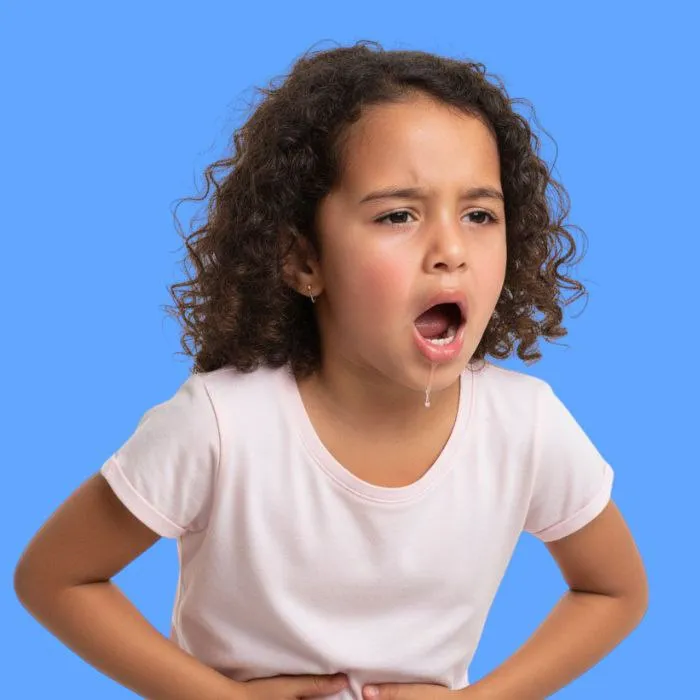What is whooping cough?
Whooping cough is a bacterial respiratory infection characterized by severe, recurrent coughing fits that end with a distinctive whooping sound.
This disease primarily affects children, but it can also affect adults and requires prompt treatment to prevent respiratory complications.
What causes whooping cough?
Infection occurs due to several predisposing factors, including:
- Infection with the bacterium Bordetella pertussis, which causes the disease.
- Transmission through respiratory droplets expelled by an infected person when coughing or sneezing.
- A weakened immune system in children or the elderly.
- Not having received the whooping cough vaccine.
- Direct, unprotected contact with an infected person.
What are the common symptoms of whooping cough?
Symptoms of whooping cough begin mildly and gradually worsen, including:
- Repeated, forceful coughing fits that may end with a whooping sound.
- Facial redness or bluish discoloration during coughing.
- Vomiting after severe coughing fits.
- A blocked or slightly runny nose initially.
- General fatigue and difficulty breathing in children.
When should you see a doctor?
It is advisable to consult a doctor in cases that indicate a worsening of the condition, such as:
- A cough that lasts for more than two weeks.
- Difficulty breathing or swallowing.
- Bluish discoloration of the lips or face while coughing.
- Recurrent vomiting after coughing.
- Noticeable general decline in the child's activity level or loss of appetite.
How is whooping cough diagnosed?
The disease is diagnosed using several methods that help determine the exact cause, including:
- Taking a detailed medical history of the symptoms and their duration.
- Clinical examination of the respiratory system and listening to the cough.
- Taking a nasal or throat swab and testing it in a laboratory.
- Blood tests to detect the presence of antibodies to the bacteria.
- Chest X-ray if the symptoms are severe.
How is whooping cough treated?

Treatment methods vary depending on the severity of the case and include the following:
- Using antibiotics such as azithromycin.
- Taking pain relievers and fever reducers as needed.
- Maintaining good ventilation to facilitate breathing.
- Drink warm liquids to soothe your throat.
- Isolate the patient to reduce the spread of infection to others.
Can whooping cough be cured?
Yes, whooping cough can be cured with appropriate treatment, especially when detected early.
Recovery time varies depending on the patient's age and the severity of symptoms, but the cough often lasts for several weeks before disappearing completely.
What are some tips for preventing whooping cough?
The disease can be prevented by following several important guidelines, such as:
- Receiving the DTP vaccine for children on schedule.
- Avoiding close contact with people who have a severe cough.
- Washing your hands regularly after touching public surfaces.
- Ventilating rooms well and avoiding enclosed spaces for extended periods.
- Boosting immunity by eating a healthy and balanced diet.
What are the potential complications of whooping cough?
Neglecting to treat whooping cough can lead to serious complications, including:
- Severe pneumonia.
- Muscle spasms during coughing.
- Bleeding in the eyes or nose due to pressure.
- Slowed or stopped breathing in infants.
- Weight loss or dehydration can result from frequent vomiting.
Frequently Asked Questions about Whooping Cough
Is whooping cough contagious?
Yes, it is easily transmitted through droplets released when coughing or sneezing.
Does the vaccine completely prevent infection?
The vaccine significantly reduces the chances of infection, but it does not completely prevent it.
How long does whooping cough last?
Symptoms can sometimes last from 6 to 10 weeks.
Can adults get whooping cough?
Yes, but it is usually milder than in children.
Should someone with whooping cough be isolated?
Yes, to prevent transmission, especially to unvaccinated children.
Article Summary
Whooping cough is a contagious respiratory illness that requires special attention, especially in children.
Prevention through vaccination, early treatment, and adherence to medical guidelines are the best ways to reduce the risk of complications.
Maintaining hygiene and a strong immune system helps prevent infection and promotes a faster recovery.